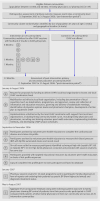Improving cardiovascular health at population level: 39 community cluster randomised trial of Cardiovascular Health Awareness Program (CHAP)
- PMID: 21300712
- PMCID: PMC3034422
- DOI: 10.1136/bmj.d442
Improving cardiovascular health at population level: 39 community cluster randomised trial of Cardiovascular Health Awareness Program (CHAP)
Abstract
Objective: To evaluate the effectiveness of the community based Cardiovascular Health Awareness Program (CHAP) on morbidity from cardiovascular disease.
Design: Community cluster randomised trial.
Setting: 39 mid-sized communities in Ontario, Canada, stratified by location and population size.
Participants: Community dwelling residents aged 65 years or over, family physicians, pharmacists, volunteers, community nurses, and local lead organisations.
Intervention: Communities were randomised to receive CHAP (n = 20) or no intervention (n = 19). In CHAP communities, residents aged 65 or over were invited to attend volunteer run cardiovascular risk assessment and education sessions held in community based pharmacies over a 10 week period; automated blood pressure readings and self reported risk factor data were collected and shared with participants and their family physicians and pharmacists.
Main outcome measure: Composite of hospital admissions for acute myocardial infarction, stroke, and congestive heart failure among all community residents aged 65 and over in the year before compared with the year after implementation of CHAP.
Results: All 20 intervention communities successfully implemented CHAP. A total of 1265 three hour long sessions were held in 129/145 (89%) pharmacies during the 10 week programme. 15,889 unique participants had a total of 27,358 cardiovascular assessments with the assistance of 577 peer volunteers. After adjustment for hospital admission rates in the year before the intervention, CHAP was associated with a 9% relative reduction in the composite end point (rate ratio 0.91, 95% confidence interval 0.86 to 0.97; P = 0.002) or 3.02 fewer annual hospital admissions for cardiovascular disease per 1000 people aged 65 and over. Statistically significant reductions favouring the intervention communities were seen in hospital admissions for acute myocardial infarction (rate ratio 0.87, 0.79 to 0.97; P = 0.008) and congestive heart failure (0.90, 0.81 to 0.99; P = 0.029) but not for stroke (0.99, 0.88 to 1.12; P = 0.89).
Conclusions: A collaborative, multi-pronged, community based health promotion and prevention programme targeted at older adults can reduce cardiovascular morbidity at the population level. Trial registration Current controlled trials ISRCTN50550004.
Conflict of interest statement
Competing interests: All authors have completed the Unified Competing Interest form at
Figures
Comment in
-
Prevention: CV risk assessment and education in community pharmacies work!Nat Rev Cardiol. 2011 Apr;8(4):182. doi: 10.1038/nrcardio.2011.34. Nat Rev Cardiol. 2011. PMID: 21553719 No abstract available.
-
ACP Journal Club. The Cardiovascular Health Awareness Program reduced CV hospitalizations but not mortality in older adults.Ann Intern Med. 2011 Jun 21;154(12):JC6-3. doi: 10.7326/0003-4819-154-12-201106210-02003. Ann Intern Med. 2011. PMID: 21690581 No abstract available.
-
Czy można systemowo doprowadzić dopoprawy stanu zdrowia sercowo−naczyniowegona poziomie populacyjnym?Randomizowane badanie CHAP.Kardiol Pol. 2011;69(7):745-6; discussion 747-8. Kardiol Pol. 2011. PMID: 21769806 Polish. No abstract available.
References
-
- Rodgers A, Vaughan P, Prentice T, Edejer TT-T, Evans D. The world health report 2002. WHO, 2002.
-
- World Health Organization. Preventing chronic disease: a vital investment. WHO, 2005.
-
- Lawes CM, Vander Hoorn S, Rodgers A, International Society of Hypertension. Global burden of blood-pressure related disease, 2001. Lancet 2008;371:1513-8. - PubMed
-
- Lopez AD, Mathers CD, Ezzati M, Jamison DT, Murray CJ. Global and regional burden of disease and risk factors, 2001: systematic analysis of population health data. Lancet 2006;367:1747-57. - PubMed
Publication types
MeSH terms
Associated data
LinkOut - more resources
Full Text Sources
Medical

